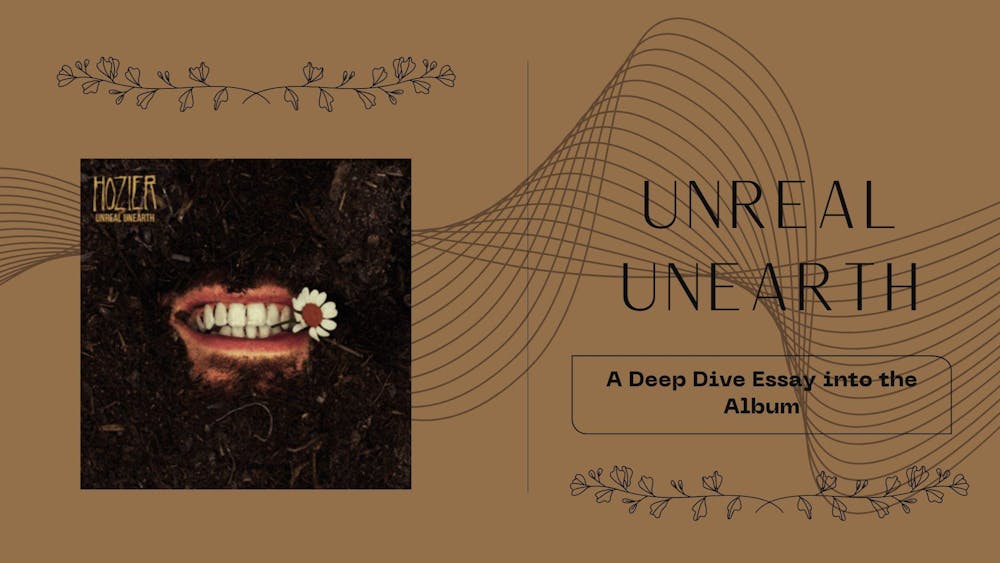Unreal Unearth
Unreal Unearth is the newest album by Andrew Hozier Byrne, known more commonly as Hozier. Hozier’s discography focuses on themes of Christianity and its flaws, as well as love’s transcendence over religion, evident in his hit single “Take Me to Church”. He is also no stranger to combining religious imagery with provocative ideas, such as in “Be” where he sings of the “same sweet shock of when Adam first came.”
Unreal Unearth is no exception to these themes of lust and the use of religious text. Hozier's obsession with classical literature led him to Dante's Inferno, on which this album is based. Unreal Unearth depicts Hozier's metaphorical journey through the nine circles of Hell, with the songs fitting into each of these circles, as well as the descent into Hell and ascent back to Earth. He compares his journey to the conflict of love and religion, as well as his own experience of love being a transformative force.
By using Inferno and classic Irish literature such as The Third Policeman, Hozier is able to create a compelling story that listeners are emotionally invested in while also sharing impactful messages. He explores the loss of Irish culture in the past and its reemergence now. Through this album, he is able to bring to light problems and contradictions in Christianity, help bring revival of Irish culture, and express discontent with the state of the world today. As the album is very story-based, it is clear that it is meant to be listened to in order, meaning some of the songs are not as impactful on their own.
Journey Through Hell
Hozier’s journey through Hell begins with the descent in the songs “De Selby Pt. 1” and “De Selby Pt. 2”, and then through limbo in “First Time”, establishing his tone and goals for the album. Pt. 1 opens the album on an uneasy, curious note with the listener unsure of what the rest of the album may hold. Tones of religious issues appear front and center, with Hozier singing, “No closer could I be to God,” despite being at the literal gates of Hell. This establishes a feeling of loneliness and even isolation from God due to Hozier's reason to traverse Hell; to find his lover that even God cannot keep him from. Hozier questions “...why He would do what He’s done,” wondering why God would rip his lover away from him for the crime of loving them in the first place. The song ends with lyrics in Irish Gaelic, foreshadowing the themes of Irish culture and awareness to come later.
Pt. 1 flows seamlessly into Pt. 2, as one might guess, continuing the descent, but with more passion. Hozier begins to blur the lines between what is real and unreal in this song, a reference to De Selby himself. The name is a reference to the character of De Selby from The Third Policeman by Flann O'Brien, a piece of classic Irish surrealist literature. In it, De Selby is a “lunatic philosopher who… doesn't know he's dead and in the afterlife,” says Hozier when describing why he chose these titles in an interview with Apple Music. After the descent in the first two songs comes limbo, established in the song "First Time”.
In it, Hozier describes his lover bringing parts of him alive and killing other parts of him, fitting the theme of limbo between life and death. Hozier characterizes his lover with the powers of life and death through this, furthering the point of his love being more powerful than religion.
In The Circle of Lust, Hozier paints desire not as a sin, but as an extension of love to be embraced and a sacred connection between him and his lover that rivals the power of God. In this circle are the songs “Francesca” and “I, Carrion (Icarian)”.
Francesca is named for the corresponding character in Inferno, a woman who falls in love with her husband's younger brother, Paolo. When her husband discovered this affair he killed both of them, damning them all to Hell. Francesca does not regret her actions, much like Hozier does not regret the sins he’s committed to be with his lover. He sings that he, “would not change it,” and “Heaven is not fit to house a love like you and I,” confirming that he believes the bond he and his lover share is a Godly force in its own right.
“I, Carrion (Icarian)” is a reference to Greek mythology and the myth of Icarus. Hozier compares the feeling of falling and flying to the love he feels for his lover. He also compares himself to a corpse or ‘Carrion’. He rises with every word his lover says to him and if he falls, he prays he will not fall away from her.
In The Circle of Gluttony, Hozier references the cultural cornerstone of Irish literature, A Modest Proposal by Johnathon Swift to comment on the state of the world today. In its time, this essay commented on how little the Irish government did to help with the Great Famine, and that people should just start to eat their young instead.
In “Eat Your Young”, Hozier is making this same proposal to the world today while tying it to the sin of gluttony. He demeans corporations for only caring about money, even at the expense of others. He sings there's, “crumbs enough for everyone,” exposing the mentality of the corporations giving little and acting like it's enough. He says that these corporations might as well start, “skinning their children for a war drum.” Hozier has historically been an activist for civil rights, women's rights, and anti-corporation, and this song drives home this mentality. Not only does Hozier simply bring awareness to these issues with his music, but he actively donates to and speaks up for these causes.
“Damage Gets Done”, in The Circle of Greed, explores youthful recklessness and the consequences that come with it through the eyes of Hozier and his lover. He reminisces on these days when he had little but felt as if he held the whole world in his hands. Looking back, he sings that no harm came to the world by them being “reckless and young,” and that he wishes he didn't want for anything in the same way he did back then. By this song being a duet with Brandi Carlile, a sense of freedom and pure bliss emanates from it, making it more impactful.
The Circle of Wrath holds “Who We Are”, a powerful song about loss, sacrifice, and self-discovery and the rage that comes with human nature. Growth is only achievable through sacrifice and loss, but that doesn't mean it doesn't hurt. In losing his lover in Hell, Hozier yearns for their touch again, singing, “...hold me like water, or Christ hold me like a knife.” Even if they hold him at a distance or let him slip through their fingers, all Hozier wants is to be held by them again. However, without them, he can become a better version of himself. He curses this process and the idea of being born in the dark, living and carving through the dark, and dying in the dark. Through loss, he feels as if he is stuck in this darkness, comparing it to human nature as just who we are.
“Son of Nyx” and “All Things Ends” take place in The Circle of Heresy, where they compare religion to a crumbling relationship, where you put all of your faith into something and it fails you anyway. “Son of Nyx” is a reflection on how far Hozier has come in his journey through Hell, incorporating leitmotifs and bits of previous songs into an instrumental piece.
“All Things End” directly compares losing belief in God to losing a loved one. This song embraces the sinking feeling one immediately experiences at the hands of loss. Although this feeling is devastating, it is inevitable and one should not seek to avoid it at the expense of growth.
The Circle of Violence focuses on Irish history and culture through the songs “To Someone From a Warm Climate (Uiscefhuaraithe)” and “Butchered Tongue”. The word Uiscefhuaraithe is unique to Ireland, with no other language having a word like it. Hozier describes it best as “the feel of coldness only water brings” in this song. In its simplest terms, it’s a love song. “It’s about the significance of something so mundane but so remarkable,” says Hozier in his interview with Apple Music. Sharing a bed warmed by your lover. “Butchered Tongue” embraces the theme of violence in a way one might not expect. It's about the feeling of loss experienced by Hozier over his language and culture. He sings of the beauty of Irish Gaelic and how tragic it is that there aren't many people left to translate it, how it's slowly fading away. By bringing awareness to it, though, Hozier is making an impact by informing the world of its importance.
Taking place in The Circle of Fraud, the music in “Anything But” takes on a light and flirty tone while the lyrics make sarcastic promises in an attempt to distance Hozier away from his partner. This circle touches on people who commit “fraud against those with whom they had no special bond of trust,” (Inferno, 126). It is clear that the bond of trust between Hozier and his lover was once there, but isn't any longer. Lyrics such as “if I was a riptide I wouldn’t take you out,” and “If I was a stampede you wouldn't get a kick,” seem genuine at first, but after a second glance, they are sarcastic and promises meant to be broken. Hozier is attempting to distance himself from his lover, which seems strange considering the devotion they've shown to each other up until this point. The next circle brings clarity to this.
The Circle of Betrayal, the most devastating of the album, houses “Abstract (Psychopomp)” and “Unknown/Nth”, depicting the fall of Hozier's relationship in a twist of fate. After spending so much time depicting the power his love had, seeing it crumble feels contradictory. However, the power it held was still real, Heaven and Hell couldn't stop Hozier from reaching his lover, but, as established earlier, all things must end.
“Abstract (Psychopomp)” is a look back on a specific memory Hozier has of his lover in a new light after losing her. In it, she witnesses a deer hit by a car, pulls over, and comforts the deer in its last moments. He's amazed by her compassion and feels he has no choice but to love her at that moment. He compares the compassion shown to the deer to her love for him and her holding him in the last moments before their breakup. He sings, “The memory hurts, but does me no harm,” and, “I'm still glad I met you.” Through everything, Hozier recognizes that he will never regret loving her and it changed him in a way he couldn't himself.
Similarly, in “Unknown/Nth” Hozier says that the hardest part of the breakup is not the being away from her, but the fact he is unknown to her now, even though he still; “could break beneath the weight of the goodness,” he still carries for her.
“First Light”, representing the Ascent from Hell, equates his breakup with his partner to seeing light again for the first time after emerging from Hell. In his interview with Apple Music, Hozier says, “Coming out the other side and having a new relationship with light…it’s something you can celebrate …for its brilliance, as opposed to something that is blinding”. Though he endured great heartbreak, he is still grateful for how it changed him. He is a new person, able to appreciate the world in a different light after being transformed by his lover.
Throughout Unreal Unearth, Hozier’s commitment to storytelling and passion are clear. This album accomplishes its goal and more, as it is an excellent concept album as well as a platform for Hozier to speak out. After hearing Unreal Unearth, one can't help but appreciate Hozier’s gift of lyricism and storytelling.
______________________
Dante Alighieri, 1265-1321. The Divine Comedy of Dante Alighieri : Inferno, Purgatory, Paradise. New York :The Union Library Association, 1935.
O'Brien, Flann. The Third Policeman. London: Flamingo/Harper Collins, 1993.
Chicago. Swift, Jonathan, 1667-1745. A Modest Proposal. Champaign, Ill. :Project Gutenberg, 1997.
Hozier: 'Unreal Unearth', Spirituality & Songwriting | Apple Music, YouTube, 28 Aug. 2023, https://www.youtube.com/watch?.... Accessed 9 Nov. 2023.
https://en.wikipedia.org/wiki/Unreal_Unearth - Album Cover/Thumbnail
https://en.wikipedia.org/wiki/Hozier - Picture of Andrew Hozier Byrne
https://open.spotify.com/playlist/6EoEYfxJA5kSUSqBqpugiZ - "Eat Your Young" Single Cover

My name's Liz (dj Traveler) and I host the show Out There Inn! I love folk, folk rock, metal, ghibli soundtracks, and video game music! Some of my favorite artists are Fleet Foxes, Hozier, Lord Huron, the Dip, and Sleep Token :) I also love hiking, painting, and reading.

